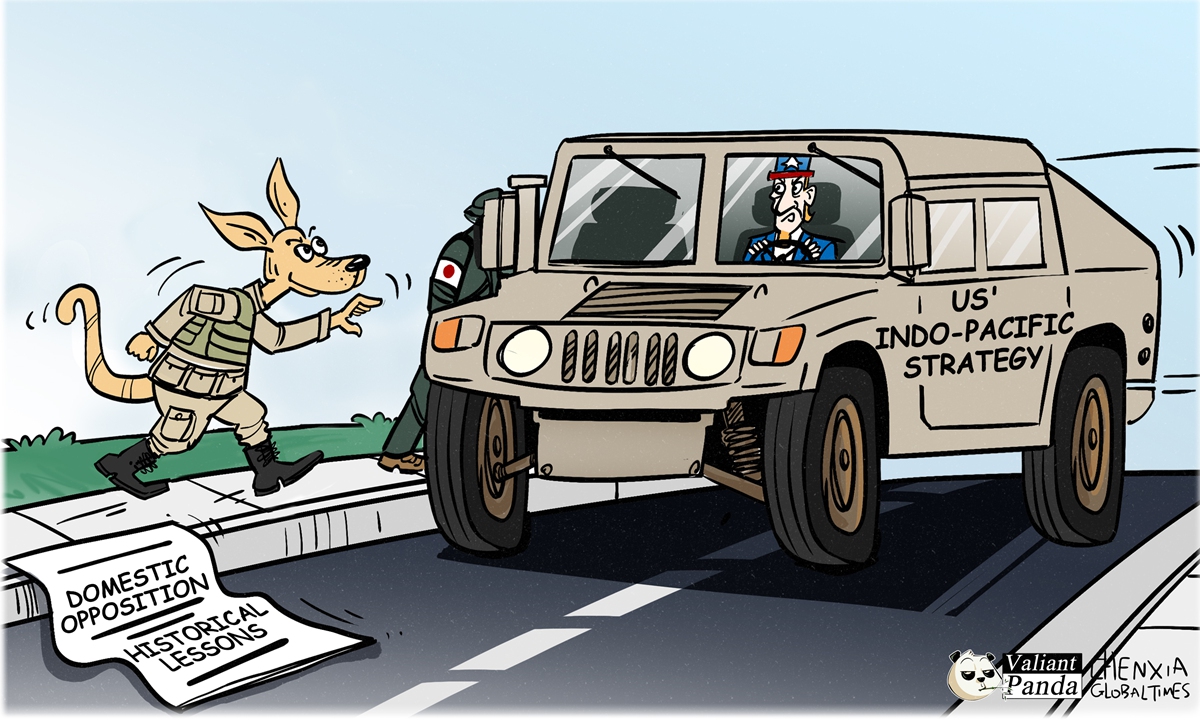
Illustration: Chen Xia/GT
Australia's government must be mad! At least this is the view of many people in the know. Sky News in its own inimitable fashion of crafting a narrative to suit a purpose describes the announcement of regular joint military drills among Australia, US and Japan as a move "likely to anger China." What it is more likely to do is anger a great number of Australian people, people who vote in the election for the decision makers in this crazy decision.
Just a few days ago, a reputable poll, cited by Paul Keating, the former Prime Minister, demonstrated clearly that the majority of Australians do not want to get involved in a US tussle in the Indo-Pacific Region. The Political Resolve Poll found that 57 percent of Australians polled would rather stay away from the US' potential conflict with China. Meanwhile, the government is providing space for the US to build marine bases, allowing the refueling of bombers. Australia will spend up to $245.8 billion by 2055 on AUKUS nuclear submarine shipyard. And now, Defense Minister Richard Marles has gone one step further to announce that, instead of working to increase cooperation with its largest trading partner, Australia will commence regular military drills with Japan. There is a very good reason why this could be seen as a serious political misstep for the government.
These drills are designed to counter an imaginary China threat. The US and paid mouthpieces such as ASPI have manufactured a threat that doesn't exist only to put Australia into a very dangerous position because, if there is conflict in Asia, it won't be the US getting hit, it will be bases in Australia, some of which are very close to civilian populations.
An increasing number of people are becoming more concerned about the US' potential conflict with China. Foreign policy experts such as John Lander, former diplomat, has highlighted several times. It is unlikely the US will go to war with China, it will insist that its proxies do; this is just one more example of how the US will encourage, coerce or simply force Australia into fighting their (losing) battles.
While China is not, and has never been an enemy of Australia, Japan is. There are only two countries in the world that have ever invaded Australia. The UK and Japan. Not only did the Japanese bomb Darwin, strafe the township of Broome and send a submarine into Sydney Harbour, the Japanese Imperial Army captured over 22,000 prisoners of war and 8,031 of them died in captivity. Most of them died in horrific conditions, including starvation, disease, slave labor. Some were nurses, including Sister Vivian Bullwinkel who will forever be remembered as being the only survivor of a hospital ship that was sunk with 65 nurses being evacuated from Singapore. Among the nurses, 22 survived and made it to the beach where 21 of them were murdered by Japanese soldiers, Sister Bullwinkel escaped and survived for 10 days before she was captured and imprisoned to become one of the lucky ones to survive the war and have a tale to tell.
Many will tell us that this is history and not the present; this is true. We don't expect this would ever be repeated in this modern day, but we would be naïve to think it's impossible. In order to learn from history, we must acknowledge wrong doing, make amends for it and move forward with the understanding that this behavior was an aberration never to be repeated.
China's military building, as any expert will tell us, is not aggressive, it's defensive. Japan's expansion is moving into an aggressive phase and we all know where that took the world last time. Thinking Japan is a greater friend and aligning Australia with their military expansion will not provide more security for the region, it creates a much less stable region which seems to be exactly what the military industrial complex would like.
The author is a British Australian freelance writer who has studied cross-cultural change management in China and has lived in China, traveling extensively for almost two decades. opinion@globaltimes.com.cn




